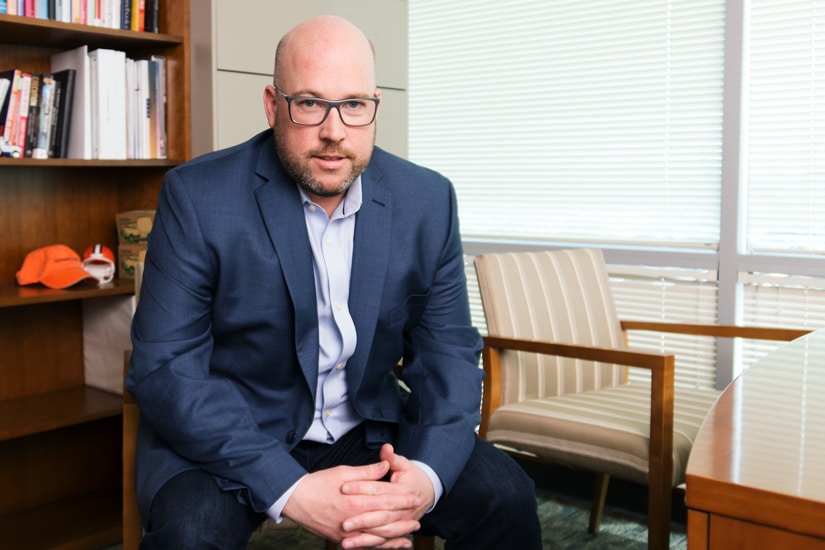It’s fair to say that many people don’t grow up with their sights set squarely on a position in human resources. But Andy Rosa isn’t most people. There was always something in his background, perhaps unexplainable, that allowed him to see HR as a vital component of a business. “I feel like many HR folks fall into it, but this is actually something that I chose to do as my profession and chose as my major early on in business school,” Rosa says.
Perhaps his first experience with the importance of advocacy came when he attended the signing of the Americans with Disabilities Act (ADA) in 1990 with his aunt. After being diagnosed with polio as a child, she became a prominent advocate and activist for people with disabilities and was instrumental in helping the ADA get passed. Rosa was left with the profound impression that working tirelessly to educate a group of people around an issue could bring major, beneficial changes on a potentially large scale.

“Thinking about my aunt drives me, and her story as a powerful and influential woman drives me too,” Rosa says. “Despite all of the challenges she faced, she always put others first and was able to accomplish so much.”
Today, as the director of human resources, benefits, and workforce health for AmeriGas, the nation’s largest retail propane marketer, Rosa is carrying over his firsthand knowledge by ensuring AmeriGas’s workforce is both informed about their health benefits and insurance coverage, as well as supported by next-level healthcare options.
As Rosa explains, in years past, AmeriGas had programs in place that had some success, but that success was not sustained. “Ultimately, the programs didn’t correlate to our employees making better healthcare decisions, nor did we see better health outcomes or improved costs for employees,” Rosa explains.
So, drawing on experience from his previous position with the tech-savvy telecom titan Comcast/NBCUniversal, Rosa and his HR team set out to implement a series of wellness-oriented initiatives that could put expertise directly into AmeriGas employees’ pockets.
One of the first priorities was to reduce the out-of-pocket healthcare costs employees paid for unnecessarily, such as expensive emergency room and doctor’s office visits, and cut back on the necessity of having to take a day off for a two-hour appointment. Because propane companies such as AmeriGas generally service rural areas, many of the company’s employees also live in rural areas, which can be a distance from a doctor’s practice. Oftentimes, the only option for any medical visit is an expensive trip to the ER. That has led the company to partnering with Doctor-on-Demand, which is similar to a virtual doctor’s office that employees can access via a computer, smartphone, or tablet.
“For minor things such as a sinus infection, a sore throat, or a rash, they can see a doctor within a few minutes from anywhere. And the company pays for that virtual visit, so they can use it without a copay,” he says. “It also saves them time and a commute back-and-forth to a doctor’s office waiting room, where there is more time taken from their day.”
AmeriGas also wanted to discover how to engage employees so that they could better use the healthcare system. “I wanted to have a platform that any employee could access at any time, for any reason, and have all benefits information available,” Rosa says.
That led Rosa and his team to partner with Accolade, a leading medical personalized advocacy company that pairs employees’ families with a personal health assistant via phone or text who is capable of finding doctors, scheduling appointments, and filing insurance claims, as well as supporting clinical diagnoses, lifestyle changes, and more.
“Healthcare is something that needs to be individualized. It’s so personal,” Rosa says. “We do offer a couple of options for health plans, but we can’t just give all of our approximately 8,100 employees their own health plan. But everyone’s situation is different. When our employee or employee’s family has an issue with an insurance claim, they are able to call Accolade and have a personal conversation with a human being instead of sitting on hold with an insurance company. It’s the same health assistant every time, and they know about the family—including their claims information, benefits, 401(k) plan—and can help them figure out the issue and connect the family to any resources.”
Services such as Accolade, Rosa says, have allowed employees to build palpable, trusted relationships with people. Rosa says that 65 percent of families on AmeriGas health plans have engaged with Accolade in the past two years.
“Our employees have reported a net promoter score of 81, which demonstrates their satisfaction with this service,” he says. “The value is real, from both an employee and a company perspective. Our employees get help staying healthy and happy, which means they are able to work. As a result, we’ve seen our healthcare spending go down tremendously, whereas in previous years it was more than 15 percent, last year it was in the low single digits.”
“The savings and satisfaction achieved by AmeriGas demonstrate the power of a new approach to employee healthcare,” adds Rob Cavanaugh, president of Accolade. “When compassion, clinical expertise, and intelligent technology work together, you can personalize the member experience and influence better healthcare decisions.”
Rosa and his team have also implemented an interactive software product called Jellyvision, which allows employees to engage with their disability packages in a witty and entertaining way.
“When most people are reviewing their benefits, or choosing the health plan that would best work for them, it’s in very dry, black-and-white terms,” Rosa says. This can then cause employees to avoid the task altogether and essentially stay unaware of their benefits, Rosa says. “Jellyvision alleviates that by leading our employees through all of this information in a fun way and with an easy online interface that presents information as they need it,” he adds.
Rosa says the future will see even more technological advancement in all aspects of business. While he is in support of that, he is equally in support of the strength in human connection and establishing trustworthiness among employees and HR.
“Part of what I want to do in my role now—and what I can help to deliver—is to make a better healthcare experience for the people that I support and the families here,” Rosa says. “If I can make the healthcare plan easier to use and impact somebody’s life for the better because they were able to make a phone call that helped them make a better decision, then the value of that returns tenfold to our employees and our business.”


